Costa Rica has long been known as an excellent sportfishing destination. Bordering both the Pacific Ocean and Caribbean Sea, there are many opportunities to hook up to some amazing trophy fish. But what about inland opportunities? In this post, we’ll share what kind of fish lurk in Costa Rica’s largest lake, Lake Arenal. We’ll also share our experience fishing on the lake and how to book a trip yourself.
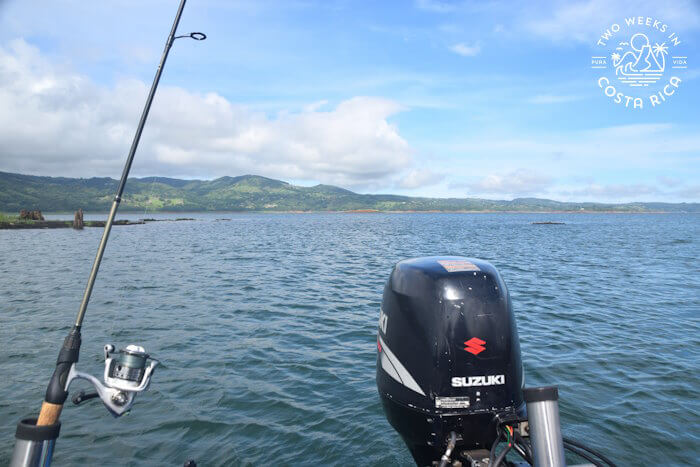
Lake Arenal
Location
Lake Arenal is located in Costa Rica’s north-central region. The two closest tourist destinations are La Fortuna and Monteverde. A few smaller towns that border the lake are Nuevo Arenal, El Castillo, Puerto San Luis, and Tronadora.
Lake Arenal is about 2.5 hours from Costa Rica’s LIR International Airport in Liberia and 3 hours from SJO International Airport near San Jose.
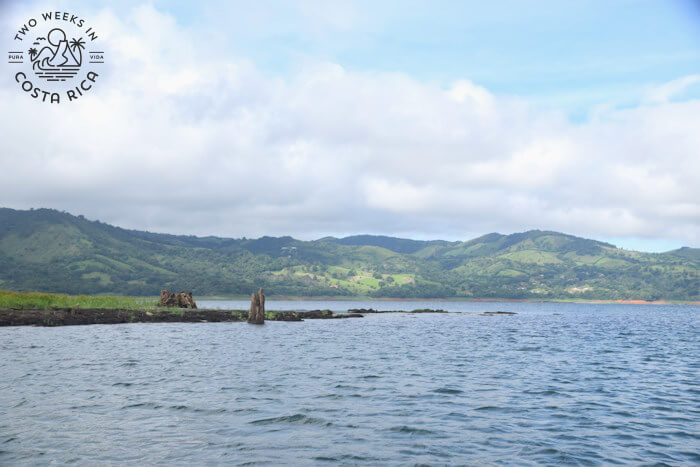
Size and History
Lake Arenal or Lago Arenal is Costa Rica’s largest lake. It is roughly 33 square miles (85 sq. km) and has a maximum depth of around 180 feet (55 meters). Surprisingly, it wasn’t always so big.
Originally, a smaller lake sat within the valley. Then, in 1979, the Costa Rican government constructed a large hydroelectric dam on what is now the eastern edge of the lake. The 230-foot (70-meter) tall dam increased the lake’s size to what it is today.
In the process, the old town of Arenal was flooded and the townspeople relocated to what is now called Nuevo Arenal (New Arenal).
During times of drought and low water levels you can still see old farm fences, and occasionally the town’s church steeple or other structures. Many trees and shrubs also were submerged, creating some excellent fish habitat.
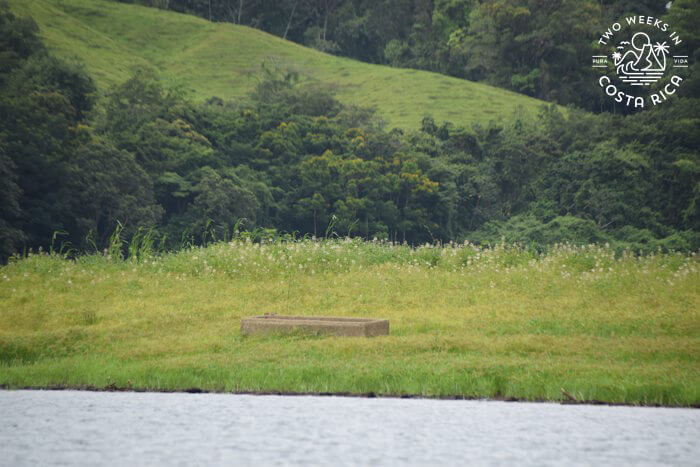
What Kind of Fish Are in Lake Arenal?
Rainbow Bass (Guapote)
As far as fishing on Lake Arenal goes, the most sought after is the rainbow bass, locally called the guapote.
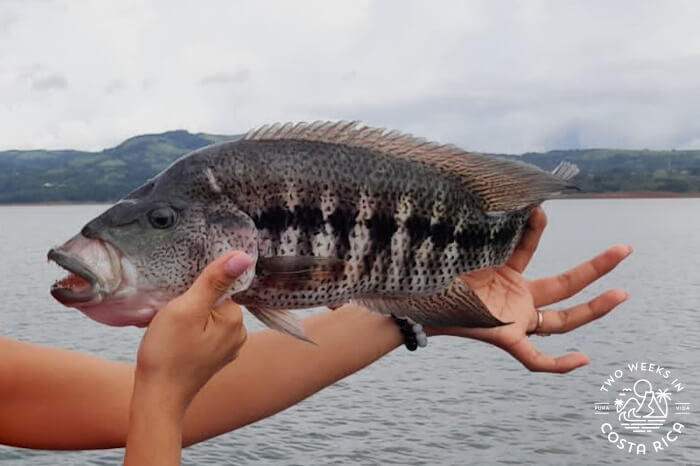
While actually in the cichlid family, rainbow bass fight a lot like a bass species. Once hooked, they will fight hard, try to retreat into dead logs and weeds, and may jump.
On Lake Arenal it is common for anglers to catch rainbow bass in the one to five pound range (0.5-2.5 kg), but they can get bigger. The world record was caught in neighboring Nicaragua. It was 15 pounds!
Machaca
Another fun species to catch is called the machaca. This fish is related to the piranha and its teeth definitely compare! Funny enough, machaca are mainly vegetarians, but they will still strike lures and baits.
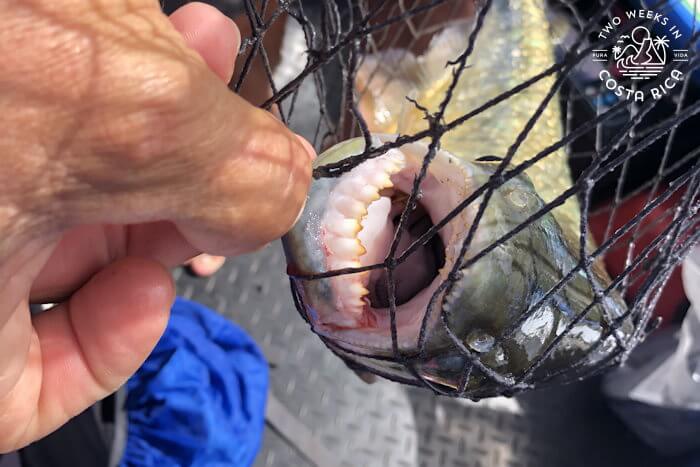
Hooked machaca fight like crazy, often jumping out of the water multiple times while pulling hard on the line. Machaca can get up to around five or six pounds.
An important note about these fish is that they will die very easily if handled too much and kept out of the water too long. It’s best to release them quickly as they aren’t very good to eat.
Tilapia
While not native to Costa Rica, tilapia have become a popular fish to farm and eat throughout the country. Lake Arenal has a healthy population of tilapia. This is likely because of a large farming site near Tronadora.
Our fishing guide told us that a crocodile once broke the netting at the farm, releasing thousands of the fish. Some tilapia caught in the lake can be over five pounds.
Mojarra
Mojarra fish also can be caught in Lake Arenal. They are similar to a panfish or perch. While they don’t get very big, they can still put up a good fight.
Our Experience Fishing on Lake Arenal
At 7:00 a.m. with a steady light rain coming down, we parked near the boat launch in Nuevo Arenal.
At the bottom of the steep ramp was our guide, Alberto. He was tending to his small bass boat and waved us closer. After a nice greeting, we bundled in our raincoats and pushed off.
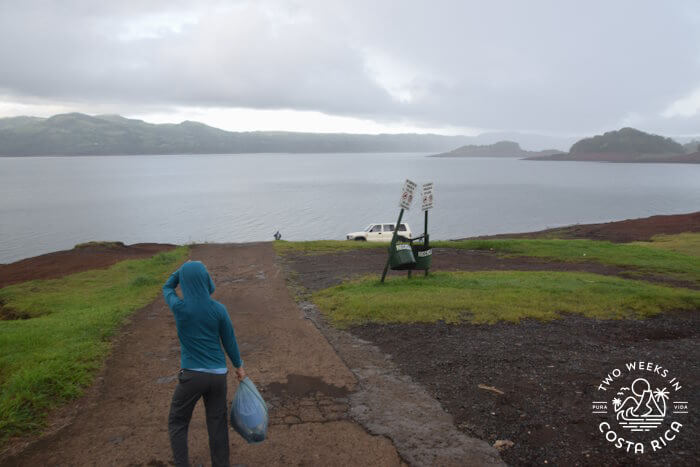
Our Guide
Alberto, we could tell, was a serious fisherman. His tackle and rods were well organized, he wore a local tournament shirt, ballcap, sun scarf, and sunglasses. The rain, which is common on the lake, did not faze him at all.
Alberto, we learned, is a Nuevo Arenal native. He lived in the old village (now at the bottom of the lake) until his family was relocated to higher ground. Throughout the day, he told us all kinds of cool stories about the area.
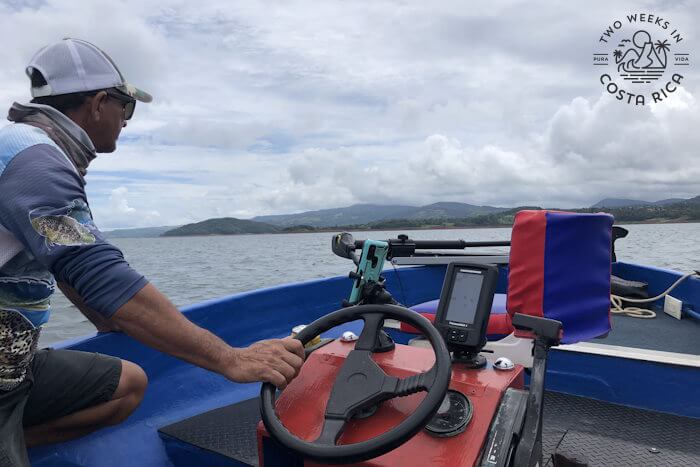
Getting Our Bearings
As we picked up speed across the lake, Alberto told us that the fish are most active along the shallow edges early in the morning.
Soon we slowed and Alberto used his trolling motor to get us close to a grassy shoreline. We could tell there was a lot of activity. Small bait fish were jumping everywhere and larger splashes could be heard all around. Luckily the rain had now stopped.
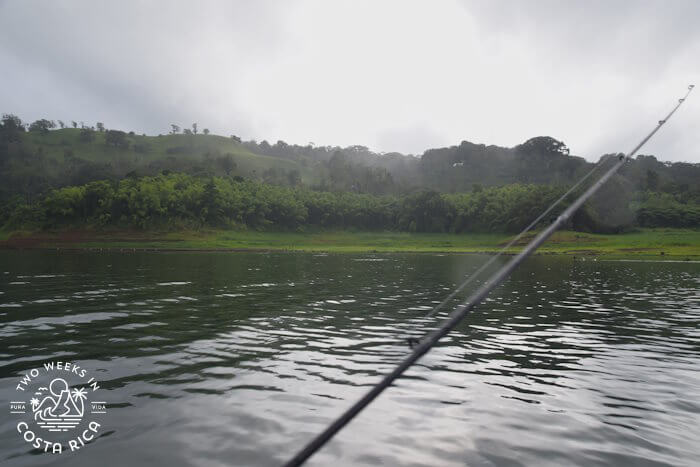
First Casts
Alberto handed Sam (age 7 at the time) and I spinning rods and told us to try to cast the spinner baits as close to the shore as possible.
Sam had never really fished before, so Alberto calmly gave him the basics of when to release the line and how to swing the rod. His patience was amazing, and Sam was quickly getting the hang of it.
Meanwhile, I cast my line, splashing the lure to the edge of the bank. After a few reels, I felt an immediate hit but failed to set the hook. Alberto told us that it was definitely a guapote (rainbow bass). They like to hunt right along the shore, he said.
Sam and I quickly cast again and again, each getting a few hits but no hookups. This was new to Sam, but I had no excuse. I was just plain rusty.
Trolling
After about 45 minutes of casting spinnerbaits without a catch, the activity in the water was cooling down. We hadn’t seen splashes in quite a while.
Alberto told us that as the sun rises, the fish often go deeper. He then set us up for some trolling, using Rapala-style minnows. We trolled at a medium speed around a small island several times.
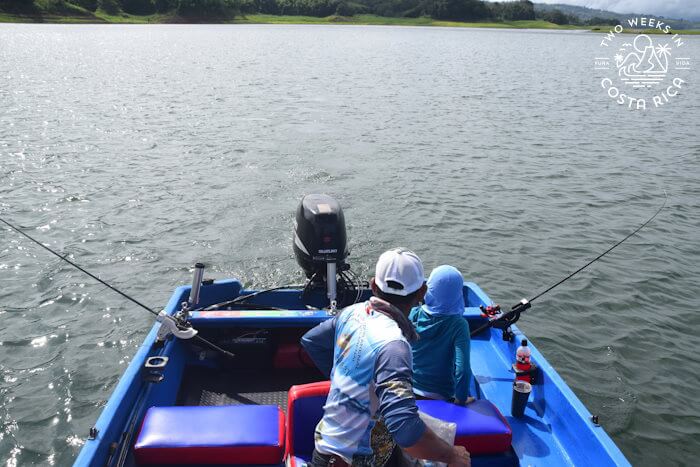
Suddenly Sam’s rod bent over and Alberto jumped into action. He helped Sam get in a good position and started reeling at a steady pace. Sam was super excited as the rod tip was jerked and swayed by the fighting fish.
After a few minutes, Alberto netted the machaca, which was about three pounds (1.3 kg). Sam’s first real catch!
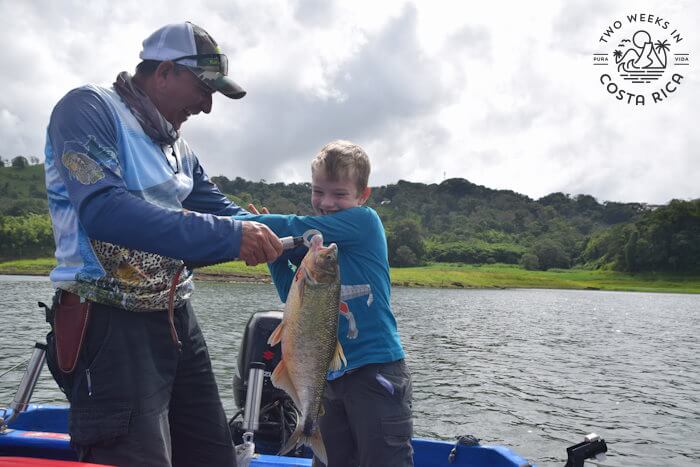
Switching It Up
After trolling around longer without more bites, Alberto decided to switch it up. We went back to casting but this time with some top water lures.
On Sam’s first cast, a giant fish splashed after his jitterbug but just missed. Alberto got a good look at it and told us it was a big rainbow bass. We kept fishing in that spot for a while but the fish never returned.
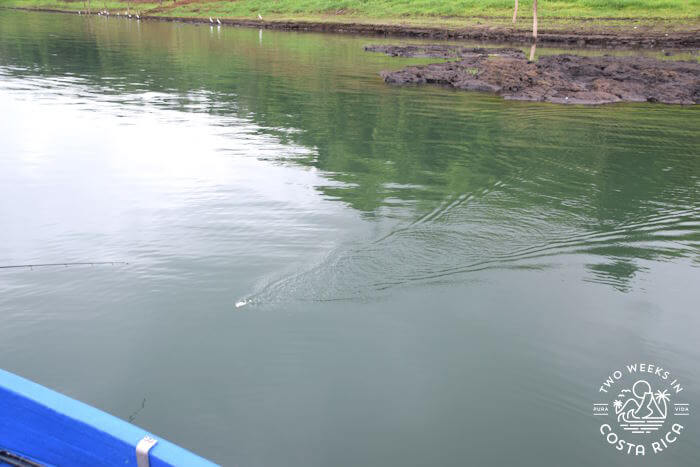
Alberto then sped us over to a different part of the lake where an old line of trees was partially submerged. It was an old farm fence made from living stumps. We cast our lines over and over but to no avail.
Back to trolling, Sam caught the second fish of the day. It was a small rainbow bass.
A Final Catch
With time running out and lunchtime approaching, it wasn’t looking good for me. We trolled around another island and hooked up to some occasional weeds but no fish.
Finally, there was a small thud on my rod. I reeled quickly and pulled up a little mojarra, about the size of my hand. While small, at least I avoided being skunked for the day!
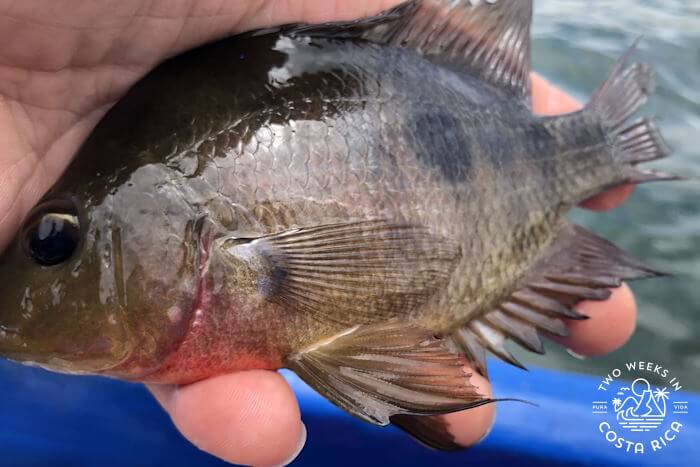
Conclusion
Our time on Lake Arenal was memorable and fun. Alberto put us in front of a lot of fish, but our novice and rusty fishing skills kept our fish count low. Nonetheless we had a blast and would love to go back out for another try. This time, for the big ones!
Booking a Fishing Trip on Lake Arenal
Fishing trips on the lake must be scheduled in advance, since boats are not just docked and waiting.
Starting Location
Most charters depart from the municipal boat ramp in Nuevo Arenal. It is important to note that this location is about one hour from La Fortuna, where most tourists are staying.
If you plan on fishing, it is probably best to stay in Nuevo Arenal for a couple of days so that you are closer. Boats can meet you close to the dam (closer to La Fortuna), but they charge a lot more.
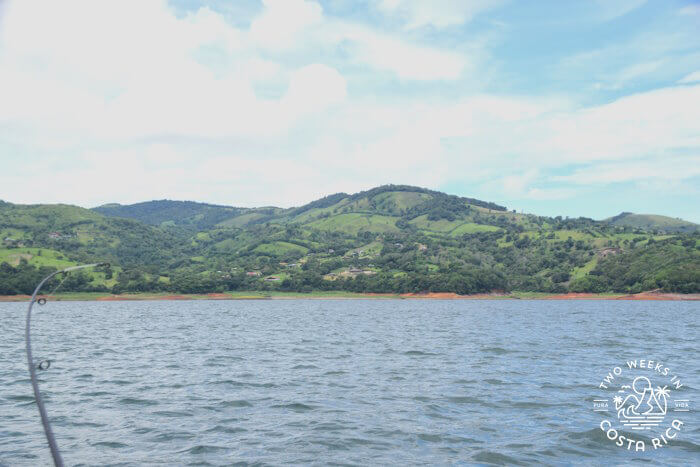
Costs (from Nuevo Arenal)
Half-day Fishing (5 hours) – $275
Full-day Fishing (8 hours) – $400
*Cost for up to two people. Extra person is an additional charge. Three to four people max depending on weight/size.
What’s Included?
All fishing equipment and tackle, fishing guide, coffee, drinks, beer, and snacks. Lunch can be arranged for full day trips.
How to Book
If you are interested in going out with the same guide we used, we would be happy to help you book that experience. Just send us an email at bookings(at)twoweeksincostarica(dot)com with the date you would prefer and how many people. We will then talk to Alberto and get back to you with all the details. Booking through us costs the same and we will make the process easy.
Have a question about fishing on Lake Arenal or want to share your experience? Leave us a comment below.
Looking for more information to help you plan? Check out these posts:
Rental Car Discount – If you are staying in Nuevo Arenal or driving to the launch site, you will definitely want a car. Use our discount to save and get free extras.
Central Pacific Coast, Costa Rica: Regional Snapshot – If you are interested in ocean fishing, the central Pacific has some great opportunities. Larger marinas with charters can be found in Jaco and Quepos.
Guanacaste, Costa Rica: Regional Snapshot – The country’s northwestern beaches are also great for fishing. Towns like Flamingo, Potrero, Coco, and Tamarindo have some good options.
